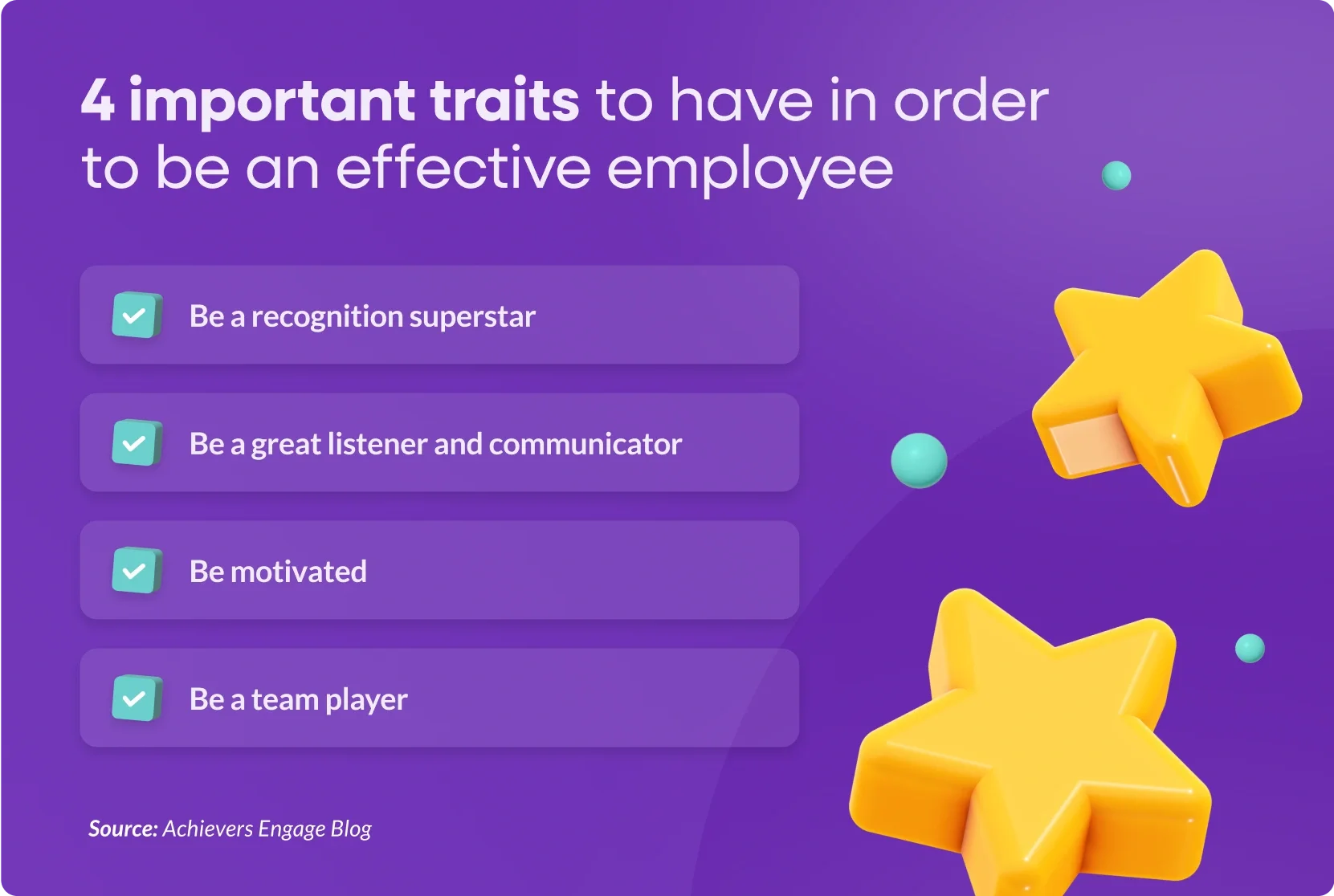Table of contents
Good employee traits are easy to spot. You know a good employee when you interact with one. They’re engaged at work, they recognize and celebrate their peers, they come up with new metrics for success, and they’re eager to take on new challenges. If all your employees were like them, your company would regularly surpass business goals.
But knowing what to look for in a good employee is only half the battle. The next question is how can you find them? HR professionals need to work with leadership to answer this question — starting with naming the qualities of a good employee and key traits to look for in potential team members. These should be the qualities that not only lead to success in your industry, but that unlock employee productivity and create a stronger company culture within your organization.
You don’t have to figure out these traits on your own. Let’s explore the 20 good employee traits all top employees should embody. These traits are essential to your company’s success, and we’re here to help you understand why.
How do you describe an excellent employee?
An excellent employee is passionate about the work they do, willing to work as a team to meet goals, and embodies the values of your organization in an authentic way. You’ll know you have a good employee on your team when their drive and engagement empower the people around them.
What is the strongest attribute of a great employee?
One of the most important qualities of a good employee is reliability. This employee completes their tasks on time without sacrificing quality. They believe in their organization’s mission. They’re always ready and willing to do what needs to be done to make your company stronger and drive key business goals.

20 qualities good employees should have
No candidate is perfect, but if you know what to look for, you can pinpoint those who will make terrific employees and help contribute to your organization in a meaningful way. Employees who embody these 20 traits make everyone around them better and bring something special to your organization. Here’s what to look for:
1. Recognition superstar
Not only is recognition one of the most significant qualities of a good employee, but it can directly affect your organization’s success. According to the 2024 State of Recognition Report, HR leaders who say their online platform includes peer recognition are 37% more likely to say their strategies drive business results.
Good employees recognize their peers and managers for big wins along with everyday victories and personal achievements. They take time to acknowledge others using specific, genuine language in public settings, and they do it frequently, in real-time. To find employees with this valuable trait, look for candidates who have a track record of collaboration.
2. Great listener and communicator
The best employees listen to others and know how to communicate honestly and transparently. They’re eager to participate in surveys and take advantage of other feedback channels because they want their voice to be heard. Our research shows employees who say their company gathers feedback are almost 2x less likely to leave compared to the average.
Outstanding employees also welcome constructive feedback because they know it makes them better. They’re willing to address specific concerns by working with team members to build collaborative action plans. Most importantly, they’re actively engaged in the process and hold managers accountable for acting on feedback.
3. Motivated
Motivated employees lead by example, showing exceptional productivity, meeting deadlines, and taking initiative. Turning leaders into motivators is essential to building a great culture.
Look for candidates who have shown engagement in previous positions and are genuinely excited about the work your organization does. They’ll get things done and inspire others to perform their best. And train your leaders on how to motivate employees to boost engagement across your company.
4. Team player
You need people on your team who aren’t boastful, who can step in when extra hands are needed, and who are respected by their co-workers. Those people are team players.
Team players build an environment of trust and psychological safety — the foundation of any inclusive company culture. They lead or at least participate in diverse employee resource groups, showing their openness and willingness to collaborate with others — which can help your bottom line. Inclusive companies are 1.7x more innovative and 120% more likely to hit financial goals. Look for those candidates who have that team player spirit and do whatever it takes to hire or retain them.
5. Empowered
Empowered employees are problem solvers that save your managers time and brainpower. They lend fresh eyes to difficult situations and focus on how they can use their skills to overcome them. They also aren’t afraid to use their voice.
But of course, this is a two-way street. Companies must cultivate a culture where employees feel comfortable enough to take projects into their own hands. Autonomy and personal growth are key. Our 2024 Engagement and Retention Report shows career progression is the number one reason employees job hunt. So don’t forget to provide avenues for growth and give your staff the tools they need to succeed.
6. Aligned with mission and culture
Employees who are dedicated to your company’s mission and aligned with its core values are more likely to contribute to its success. When scouting for talent, make sure that your corporate mission is clear and clearly outlined in job descriptions and interviews. Explain how your company rewards staff for behavior in line with company values. This will show potential employees that you’re committed to your mission and support employees who are as well – so no matter what they’re doing, your employees are excited to represent your organization.
7. Leadership qualities
Leadership is a pillar of any successful organization, but insights from LEADx’s 2024 Leadership Development Benchmark Report show that 46% of CPOs surveyed say leadership development isn’t mandatory in their organization. That’s a missed opportunity. Leaders can perform under pressure. They point out where things could be improved respectfully and can come up with solutions to problems. Leaders also highlight the great work that their peers do, recognizing the importance of teamwork.
8. Eager to learn
Employees who are eager to learn are valuable assets to your organization. In a survey by Resume Lab, 79% of U.S. respondents said they actively sought out opportunities to learn new things at work. Don’t let this desire go to waste.
Rewarding folks for learning new skills, putting forth exceptional effort, and trying new tasks will keep this professional growth loop going. Promote employees who show excitement when tackling challenges and expanding their talent. This sends a clear message to your employees that ambition and drive are encouraged and rewarded.
9. Emotionally intelligent
Good employees abide by the golden rule — they treat others the way they want to be treated. They demonstrate integrity by being respectful, are honest when they make a mistake, and show transparency and honesty when interacting with co-workers.
For these reasons, emotionally intelligent employees are typically very popular among their peers. They’re personable, lend a sense of community to your organization, and keep their co-workers engaged in their work. As an HR professional, it’s important to look for candidates who show empathy, and self-awareness, and can give clear examples of when they’ve had to respond to workplace situations with these specific traits.
10. Adaptable and flexible
Your organization is always changing and evolving. It’s important that the people you hire and retain can adapt to those changes, whether it’s a shift in responsibilities, new technology integrations, or a complete overhaul of company practices. As the future of workplace flexibility changes with the introduction of more remote and hybrid environments, being flexible and adaptable is a good employee trait to look for in your new and current hires.
Look for candidates who are agile and understand the changing landscape they’re a part of. That self-awareness will be invaluable as you scale your organization.

11. Problem solver
Being a problem solver is one of the most valuable traits an employee can bring to the table. No matter how successful your organization is or how much growth you experience, there are always challenges that come up — big or small. HR leaders should look for individuals who can approach challenges with a clear, solution-focused mindset.
These employees don’t just name problems — they think critically and creatively about how to fix them. Problem solvers are also great collaborators and are often the ones to rally others together to find the best solutions.
12. Proactive and takes initiative
Employees who take initiative don’t wait for instructions — they take it upon themselves to look for opportunities to improve processes, contribute to projects, and solve problems. This is a good employee trait that shows a keen sense of ownership and accountability, which is necessary to drive progress in your organization.
Proactive employees also help to create a forward-thinking, dynamic work environment where challenges are tackled before they become obstacles. By nurturing this trait, you encourage a culture of belonging and continuous improvement and adaptability — helping your organization stay ahead of the curve in a competitive business landscape.
13. Accountable and responsible
When team members take ownership of their work, it helps build a culture of trust and reliability. However, for employees to feel comfortable being accountable, organizations need to create a psychologically safe environment at work. This means making sure employees feel supported and not afraid to make mistakes.
When employees know they can take responsibility without fear of backlash, they’re more likely to learn from their experiences, grow, and be motivated to meet their goals.
14. Reliable and dependable
Every organization needs employees they can rely on to help work towards common goals and amplify the values of the company. When employees can meet deadlines and follow through on their responsibilities, it builds a foundation of trust and stability that can be felt across the company.
During the hiring process, ask about past experiences, and how they’ve handled deadlines, or have them share an example of an unexpected issue they were able to solve. These questions can help gauge if they have a strong work ethic and their commitment to solving problems. If they can meet these expectations, you can feel confident they’ll be an asset to your organization.
15. Results-oriented
Your organization has clear goals it’s working towards each year, and it’s essential that the people you hire to represent the company share that passion for driving business results.
During the hiring process, look for candidates who have a history of meeting targets, showcasing not only results but also the marketability of their skills and contributions in previous roles. Ask for specific examples of how they’ve set goals and what steps they took to accomplish them. This will help you identify the right talent to add to your roaster.
16. Resilient under pressure
In any workplace, employees face pressure to perform at a high level. When hiring, look for candidates who can show how they’ve handled high-pressure situations, like tight deadlines or unexpected challenges. However, it’s not just about the employee’s ability to cope. Recognition plays a critical role in fostering resilience under pressure.
A Deloitte study found that 85% of employees who are regularly recognized feel their organization cares about their well-being, and they tend to rate their workplace higher. Moreover, employees who receive consistent recognition are 56% less likely to seek other job opportunities, reinforcing the value of ongoing recognition.
17. Innovative and creative thinker
Innovation and creativity are an essential part of staying competitive, and it’s a good employee trait to have in your organization. Employees who bring innovative ideas to the table and who are willing to think outside the box are going to help drive your business forward.
During the interview stage, have them offer examples of times they’ve collaborated in brainstorming sessions or introduced a new process at their last workplace. Additionally, consider the employees you already have who have shown those qualities, but who maybe haven’t been nurtured and encouraged to really shine.
18. Detail-oriented
Being detail-oriented is an employee trait that can set candidates apart. The ability to notice small details, come to work prepared, and ask important context questions shouldn’t go unnoticed during the hiring or nurturing process. People who pay close attention to the small things are often the ones who catch potential issues before they become bigger problems and ensure work is done right the first time.
These employees tend to be organized, thoughtful, and thorough, meaning they can easily ensure accuracy at every stage of their work. Their ability to focus on details helps prevent errors and boosts overall productivity, keeping everything running smoothly.
19. Strong time management skills
People who manage their time well know how to juggle tasks, prioritize what’s important, and stay on track without getting overwhelmed. These are the employees who can stay focused, avoid procrastinating, and still meet their goals without burning out.
The key is creating a work environment where productivity is encouraged. Slack’s 2023 State of Work report tells us that 43% of employees find it challenging to stay motivated, and 29% struggle to keep their focus. By hiring candidates who have initial time management skills and ensuring their workplace culture encourages that behavior, you can set your organization and its team players up for success.
20. Positive attitude and mindset
An optimistic employee with a positive mindset can make a world of difference in the workplace. Employees with this kind of attitude are more likely to find creative solutions to challenges and bring motivational energy to the team. This trait can have a direct impact on teamwork and collaboration in the workplace. Plus, they’re often the ones who adapt quickly to changes and keep their cool under pressure.
For HR professionals, this trait is pure gold. Having an optimistic employee on your team doesn’t just boost team morale — it helps shape a healthier, happier, and more productive workplace that can help deliver business results.
Build a winning workforce with Achievers
When it comes to building a workforce that’s engaged, innovative, and results-driven, good employee traits matter. While no employee starts off with all the important qualities of a good employee under their belts — you can provide them with the tools they need to grow and make a meaningful impact at work. That’s where modern HR solutions come in. With the right employee recognition platform in place, you can set the stage for these traits to develop in your organization. It’s all about creating an environment where employees feel like they can put their best foot forward.
Achievers is an end-to-end employee recognition solution designed to help organizations build the workforce they want to see. Through science-backed resources and a dedicated community of support, we help business leaders foster inclusive environments that bring out the best in their employees.



